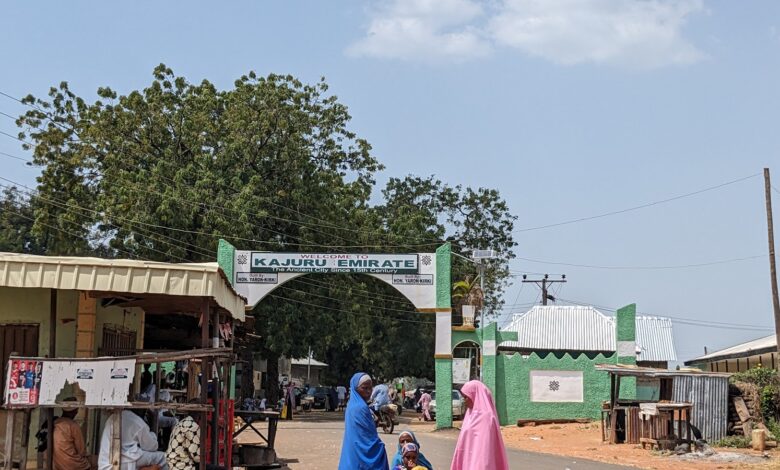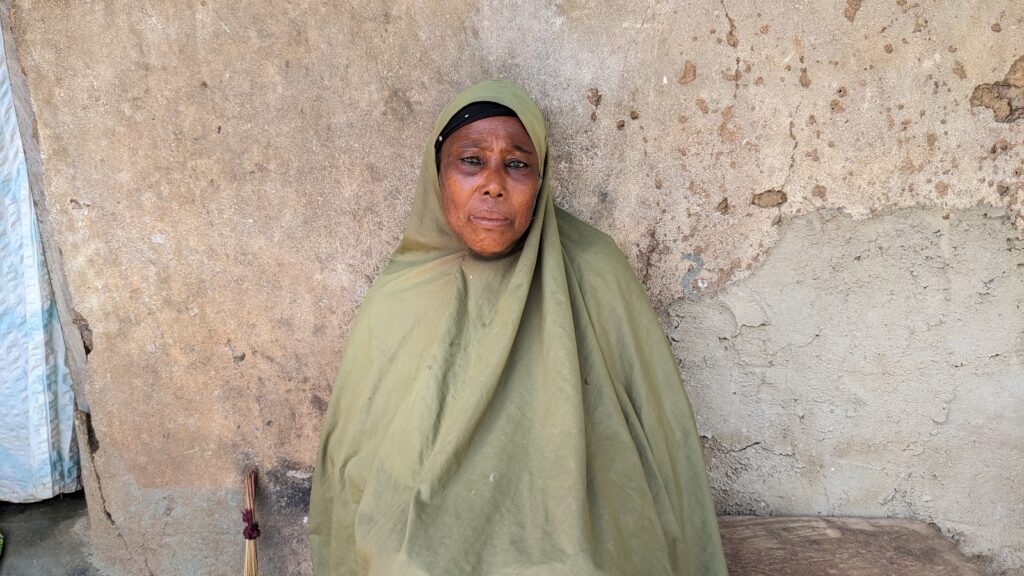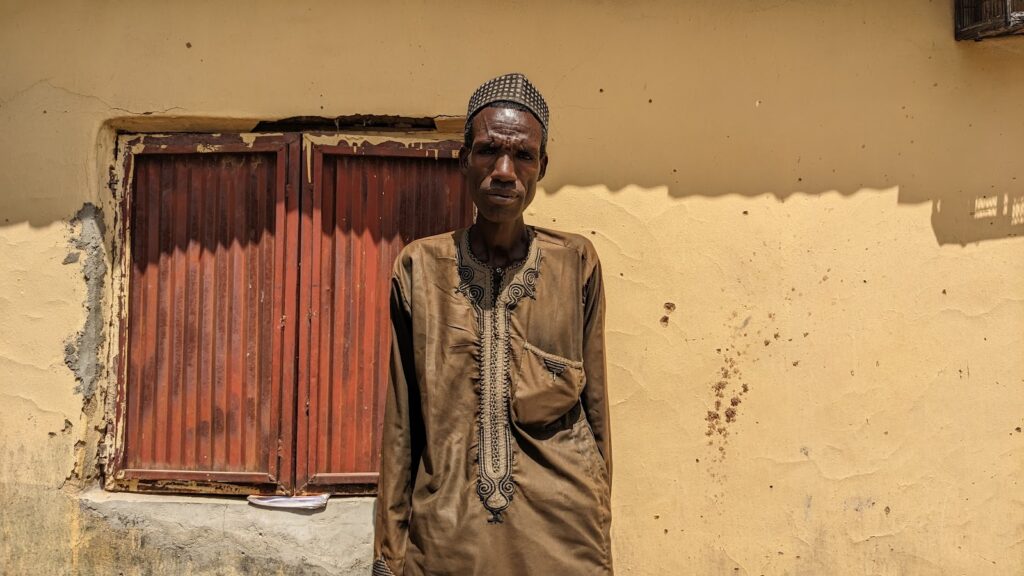Once Independent, Now They Depend On Palliatives. But For How Long?
Some of the displaced in Kajuru, a local government area in Kaduna State, northwestern Nigeria, were mostly farmers or herders until violent conflicts uprooted them from their homes and sources of livelihood. Now they ask for something beyond the government’s hand-outs.

At 67, Kaltume Abdullahi was content being a widow. She was also fine selling food at a small spot in Kutura, a village in Kajuru Local Government Area (LGA) of Kaduna State in Nigeria’s North West.
Once, she visited her children in the town of Kajuru at the family house she used to stay in before her first husband died. Then she remarried and moved to Kutura, where she remained even after her second husband passed away ten years ago.
“I had a thriving business selling food in the village. I would cook rice, yam and eggs, beans pudding and Tuwon shinkafa,” Kaltume said. She also hired young girls to hawk the food she cooked.
But this life she enjoyed and that feeling of contentment would soon change.
The struggle
It was not the fire that reached Kaltume first, but the screams of her neighbours. And before the armed men reached her compound, she had joined the stream of people running away from the chaos. It was 2019.
None of the villagers stopped to look back, and despite her age, Kaltume found she moved with the surprising agility of a girl.
“They came in the evening around 4 p.m. I had just prayed Asr prayers when I first started hearing the screams. I decided to peep out the door and see what was happening, that’s when I saw fire and people running. I just knew I had to run with the other villagers trying to leave.”
The village was far from Kajuru town but they ran all the way. “I didn’t look back and didn’t even realise how far I had come till I arrived,” she told HumAngle.
Kaltume’s five children from her first marriage are scattered across the state – three in Kajuru, one in Kaduna, and the other in Zaria.
In Kajuru, things are hard for the entire family. With no capital to start a business, coupled with her age, Kaltume depends on the generosity of her already struggling family.
By August 2023, the Kaduna State governor, Uba Sani announced that the state would distribute palliatives to 1,050,000 poor and vulnerable citizens. With a two billion naira budget, the state hopes to feed 210,000 households. It also promised to provide free transportation and revive the train system which is expected to run from Zaria, Kaduna, and Kafanchan in order to help ease the suffering experienced as a result of the fuel subsidy removal.

It was this help that reached Kaltume in Kajuru on Oct. 8.
“A neighbour told me that they were looking for me at the court.” At first, Kaltume was terrified, wondering why she was needed at the court considering she didn’t do anything wrong, until the woman calmly explained that aid was being distributed to vulnerable, old and displaced people.
Kaltume was given five measures of rice. Three out of five women in the family were able to get the aid apart from two women. “We just finished the rice the day before yesterday and we shared what we had with each other. That’s how we have been living our lives even before we got the donation. When one gets, they share and if we don’t have it, we all stay that way.”
Kaltume was grateful for the rice because, without it, she would have gone hungry or have much less to eat. “It didn’t matter to me that it was the only thing they gave us or that it didn’t last long. I have never received any help from the government before,” she said. With the way things were going, she knew that the family would slip back to the old ways of not knowing where the next meal would come from. But she believed she was not in the position to be ungrateful for whatever help was given to her.
More rice as palliative
Joshua Giwa received his first government aid at the age of 54, three years after his village in Unguwan Hauta, Boda, Kajuru LGA started experiencing a crisis in 2020.
“They didn’t kill anyone in my family but some of my neighbours were killed,” he said.
The village was attacked around 10 p.m. when the villagers had started retiring for the night. Giwa and his family didn’t wait until they were attacked before they left along with many others.
“There were about 10 houses in the village as it is a very small one and there is no one still staying there at the moment. We didn’t leave till the last day because we were terrified of being attacked in the night.”
The 54-year-old farmer, his wife and eight children left the community they had spent their entire lives behind for Kasuwan Magani in the same Kajuru. There, a relative gave them shelter.
Still harbouring the hope of returning to their village, Giwa’s family were forced to adjust to a new reality. With no land of their own, he had to rent somewhere he plants maize, groundnuts and guinea corn.
“My life was much better back in my village, I used to plant more in my farm including rice and I had more to sell. But now with the lack of adequate fertiliser, I barely get enough to feed my family and usually don’t have some to sell,” he explained, adding that a sack of good fertiliser is now between ₦24,000 and ₦26,000 (about $29 and $31).
So Giwa was happy when he learnt that his name was on the list of people getting the government palliative. “I really appreciated the way the rice was shared and I believe it helped the people that really needed it. My neighbours, such as those disabled and old have all received the donation of rice.” A 50kg sack of rice was divided between two people.
Giwa added that the bags of rice did not go around as they had desired despite their efforts to do so. He pointed out that the best palliative for him would be government provision of free fertiliser. This would enable people provide for their families long term.
“Fertiliser is the most important thing for us because it’s easier to access pesticides but fertilisers are hard to come by for struggling farmers like us.”
Lawal Idris, a member of the committee responsible for sharing the Palliatives in Kajuru said, ‘The people on the list were chosen with the help of the traditional leaders in the community but for those that are vulnerable and yet to receive it, we are hoping their names will show up on the list for the next batch we get from the government which we are waiting for.”
A breadwinner in distress
In Oct. 2023, Abubakar Ibrahim received five measures of rice as part of the Kaduna State government’s move to alleviate citizens’ suffering. But the palliative barely lasted a week. This was mainly because no other member of the family got the aid.
Before their displacement, Ibrahim was a herder capable of taking care of his family’s basic needs. They had spent their entire lives in a part of Kajuru called Tantatu.
But one day in 2019, an attack happened unexpectedly around 1:30 p.m. “They attacked people and set houses on fire. Some of them were holding guns, others sticks and some cutlasses,” he narrated.
Ibrahim had been away from home with other herders to graze sheep. This was when they heard rumours of a possible attack. “We thought it was a lie at first, but to be on the safer side we called our families and told them to quickly leave for Kajuru town.”
It was on his way back home that he came across the armed men. Fortunately, he was able to escape unharmed.
Some relatives in Kajuru town gave his family a place to stay. But things have not been easy since. Leaving all they had behind meant they didn’t have anything to fall back on.
In an attempt to continue progressing, Ibrahim ensured his last two children got enrolled in a primary school. But his older children, who are all girls, do not enjoy this privilege. The burden of doing this and feeding his family at the same time was great.

“A kind relative gave me a small plot of land that I have been farming on but what I get isn’t enough to feed my family, talk less of having excess food to sell for profit.”
Asemi Giwa, a member of the committee responsible for distributing palliatives in the local government area told HumAngle, “We give priority to disabled people, widows, old people and displaced people and the rice is shared equally to all people irrespective of religion or tribe. We sometimes use polling units and seek the help of traditional leaders in order to ensure that the palliative reaches the people it is meant for.”
Ibrahim is grateful for the government’s efforts, but “I wish we were given enough to last us for a while,” he said. Unfortunately, at the moment, it is like they had never received any kind of support. Then, of course, the increase in prices of foodstuff makes feeding his family much more difficult.
“Sometimes, I get help from relatives. Someone I know recently sent me 30,000,” he said. And to the best of his ability he tried to use the money wisely. The idea was to purchase a bag of maize that would go a long way in solving their food needs. But he was disappointed to find out that it was not enough to get a full sack.
Ibrahim believes that people like him need as much help as they can get. Apart from the most basic needs, such as food, he said fertilisers for farmers will go a long way in helping them provide for themselves.
Patiently waiting
Dorothy Usman lived her entire life in Kutura, Kajuru LGA; the only time she left the town was when she went to study at Kajuru town. But soon after she graduated from secondary school, she met her husband and got married in 2013.
The 33-year-old woman is currently a single mother of three after her divorce in 2020. Her ex-husband completely stopped taking responsibility as a parent even before the displacement, she says.
“He never checked in on us, and the responsibility to raise and provide for the children was squarely on my shoulders. Even after we got displaced, he didn’t bother to look for us. I don’t even know where he is right now.” Dorothy was at home with her children, mother and sister in 2021 when they started hearing gunshots and screams.
“They were also setting houses on fire and we knew we just had to run. I backed my last child on my back and the other was held by my sister while my first child ran along.” The family ran with the other villagers not knowing when they should stop or where they were headed.
“We stayed in the primary school in Mararaban Kajuru as we didn’t have anywhere to go to.” Luckily for them, some good Samaritans later offered them a place to stay. “The owner of the house doesn’t ask us for rent because he knows how badly we are struggling,” she said.
Back in Kutura, Dorothy used to farm and sell fried potatoes. But now, she helps her family by working on other people’s farms. “I don’t know why my name didn’t come out on the list of people getting the palliative but we hope we will soon get it when the next batch comes.”
Dorothy is aware that the rice given by the government will not solve all her families’ problems, but it will feed them for a few days and they need all the help they can get.
“I don’t want to give up hope and many people are saying that it will eventually reach us all. It is overwhelming taking care of the children on my own and it doesn’t help that everything is getting more expensive.” But she is grateful to the neighbours who try to help her family even though life is hard for them as well.
“I believe the best thing that can be done for me is getting me a stable job or business that can help me support my family in the long run,” Dorothy said, adding that she hopes she can go back to her old life someday.
Support Our Journalism
There are millions of ordinary people affected by conflict in Africa whose stories are missing in the mainstream media. HumAngle is determined to tell those challenging and under-reported stories, hoping that the people impacted by these conflicts will find the safety and security they deserve.
To ensure that we continue to provide public service coverage, we have a small favour to ask you. We want you to be part of our journalistic endeavour by contributing a token to us.
Your donation will further promote a robust, free, and independent media.
Donate HereStay Closer To The Stories That Matter




